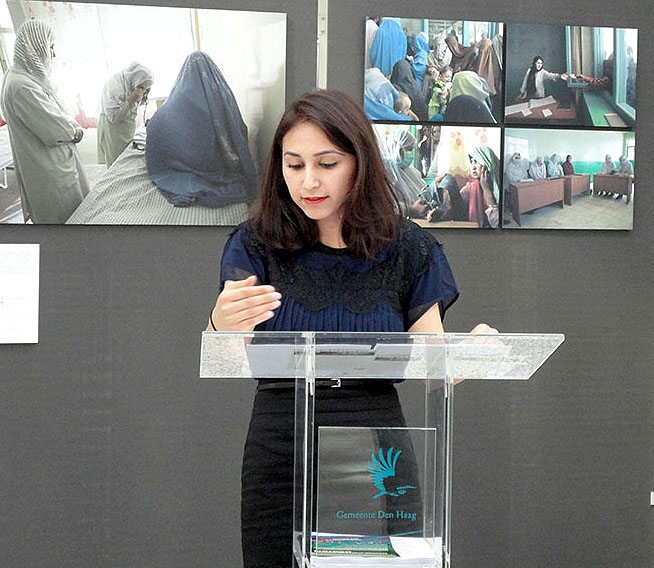
‘As a former refugee, I want to give something back’
Niloufar Rahim, from Afghanistan, fled to the Netherlands with her family. She studied medicine in Leiden and now shares her knowledge with students of medicine in Afghanistan.
What are you doing now?
‘I graduated this summer. I want to specialise in child medicine, but it’s not easy to get a place. For the past year I’ve been giving courses in Afghanistan that I trained for myself in the skills lab at the LUMC. I’ve also been a member of the Keihan foundation since I became a student, and I teach clinical skills to medical students in Kabul. In the Netherlands it’s standard practice to acquire skills like resuscitation, taking blood and giving vaccinations before you go onto the wards. It’s really important that you can do these things as a doctor, but in Afghanistan it’s not common practice. There it’s all about the theory. The goal of Keihan is to set up an independent skills lab in Kabul. In the spring of 2016 I’m hoping to travel to Afghanistan with equipment such as resuscitation dolls, drips and needles. The next step is to train new trainers.’
Why don’t doctors in Afghanistan have this kind of training?
‘They aren’t so keen on teaching. The older lecturers are rather proud and they don’t take blood themselves, for example; they leave that to the nurses. Not only that, the older generation are generally not so familiar with new protocols and the courses aren’t incorporated in the curriculum. It’s no easy matter to discuss these issues with the older lecturers. The system is quite corrupt. Lecturers can decide who passes and who fails. Fortunately, the head of Kabul Medical University is very progressive and open to change.’

How did you end up in Leiden?
‘I was living with my family in Kabul. Because of the war, we fled to Iran and in 1997 went from there to the Netherlands. We stayed in asylum centres, but fortunately quite soon – within six months - we acquired refugee status. I chose medicine, mainly because my parents strongly encouraged me in that direction because it’s a profession that offers security. I decided on Leiden for a practical reason. I had already moved house so many times and I wanted to stay living with my parents in Alphen aan den Rijn. Leiden was very convenient.’
Just how much did you become a true Leiden student?
‘I wasn’t someone for parties and I didn’t have the traditional kind of student life because I was living with my parents. In the Afghan culture it’s not so normal or easy to go out socially. In all honesty, it’s not something that really interests me. Thanks to my voluntary work, I had enough to do and I also got to know a lot of people. One of the things I do is to help Afghan medical students who are able to study in Leiden for a short while thanks to the lustrum crowdfunding activity ‘Give students a chance’.
What motivates you?
‘I was one of the few people who had the chance to flee, so now I want to do something for others who need help, both in the field of medicine and socially. I took a trainers course at the LUMC and learned a lot from the skills lab in the LUMC where students can practise their surgery skills. During my studies I also joined the International Federation of Medical Students’ Association. I organise all kinds of activities for asylum centres in Leiden and Katwijk to try to make the time as pleasant as possible for the people living in the centres, even if it’s only putting a smile on children’s faces. I also organise lectures to raise students’ awareness of human rights and what it’s like to be a refugee.’
Afghan people can learn a lot from Dutch people. What can the Dutch learn from Afghans?
‘Afghan culture is very different. There is more hierarchy, but I still experience the culture as less formal. Everyone has respect for one another and you soon build warm relationships. In the Netherlands people keep their distance more. At least, that’s my experience.’
(LvP)
Who: Niloufar Rahim (28)
Study programme: Medicine (2006-2015)
